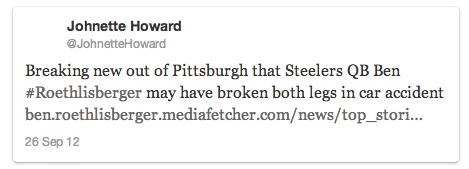Fake Roethlisberger story doesn’t fool increasingly savvy public, media
Some people, including the odd reporter or two, got taken in by a sports-news hoax yesterday. But there’s some good news. It looks like we’re all getting better at not getting taken in.
The fake news story about Ben Roethlisberger breaking both legs in a car wreck did not get picked up by any major news outlets and, as far as I can tell, didn’t create much of a storm on social media.
The report came from a hoax website called Global Associated News.
Deadspin’s Dom Cosentino writes, “That the item appeared on a web page with a warning at the bottom that says “THIS STORY IS 100% FAKE” didn’t stop people on Facebook and Twitter from believing it.” But that’s a bit misleading. Even with the all caps, the warning is in tiny type at the very bottom of the page. It looks like the kind of boilerplate small print that pretty much nobody in the world reads.
But still, we’re not talking about how this person repeating the story led to that person repeating the story led to that person repeating it, each a little more prominent and “trustworthy” than the last, until finally it hits some large, mainstream news outlet before everyone figures out the damn thing’s bunk.
Update: I originally wrote that ESPN columnist Johnette Howard didn’t parrot the report, but Deadspin’s Cosentino points out that she did in a since-deleted tweet reproduced in Cosentino’s story. It reads, “Breaking new out of Pittsburgh that Steelers QB Ben #Roethlisberger may have broken both legs in car accident,” with a link to the hoax story:
Howard then asked ESPN NFL writer Adam Schefter on Twitter if he could confirm it.
@adamschefter Any details on reports out of Pgh that Ben #Roethlisberger injured both legs in a traffic accident?ben.roethlisberger.mediafetcher.com/news/top_stori…
— Johnette Howard (@JohnetteHoward) September 26, 2012
A couple of her followers quickly pointed out that the links at the top of the site with the story weren’t clickable, and that GNA is “a website that generates fake news stories.”
Less than 10 minutes after asking Schefter for confirmation, Howard retweeted Pittsburgh Tribune-Review sportswriter Alan Robinson’s tweet saying Roethlisberger had just been spotted in the locker room.
FYI: Ben Roethlisberger was in #Steelers locker room less than 30 minutes ago, when practice ended.
— Alan Robinson (@arobinson_Trib) September 26, 2012
One reporter who did get burned was golf writer Ron Sirak, and look what he did: He didn’t source the report. He tweeted the information as though he had gathered it.
Spokesperson for Pennsylvania highway safety authority says @steelers QB Ben Roethlisberger has broken both legs in a traffic altercation.
— Ron Sirak (@ronsirak) September 26, 2012
It took Sirak about 10 minutes to realize his mistake.
It really wasn’t necessary to read that boilerplate warning at the bottom of the story page. Following best practices for verifying stories online or through social media—which most people seemed to do—would have gotten you to the truth:
- Consider the social history of the source.
- Ask: Was the source in a position to know what he claims to know?
- Seek official corroboration.
- Seek social corroboration.
- Only report what you know to be true, and tell your audience how you know it.
The first four of those come directly from an excellent Jeff Sonderman piece at Poynter.org. For more, follow these links:
- Verifying sources: A primer and checklist
- How can we be both fast and right?
- Bleacher Report Attribution Guidelines
And hey: Nice work out there yesterday.
-
K M
-
King_Kaufman
-
Ken Kraetzer


